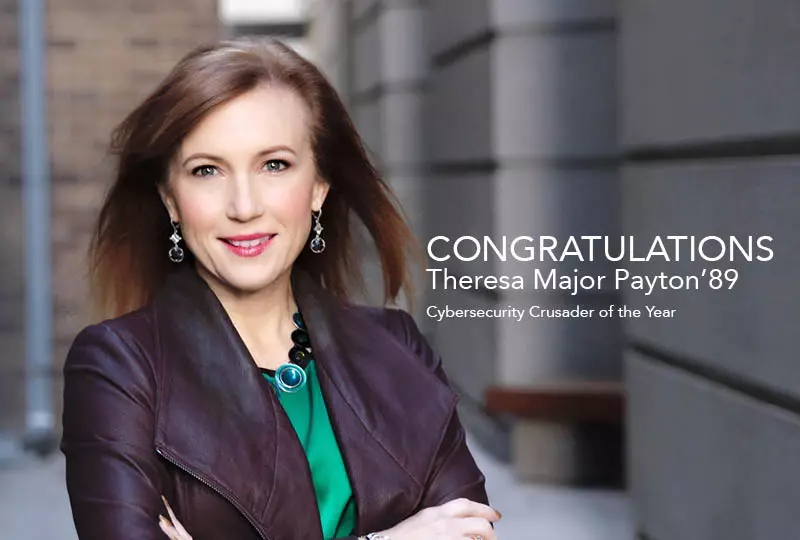By Tyler Walsh ’26
Theresa Payton, a 1989 graduate of Immaculata University and the first woman to serve as White House Chief Information Officer, says her career has been shaped by “faith, ethics and a calling to protect others,” as much as by cutting-edge cybersecurity tools. Now, her legacy is cemented on campus through the newly named Major-Payton School of Business, honoring both her achievements and her parents. From leading operations for the Executive Office of the President under President George W. Bush to founding her own cybersecurity firm, Payton’s journey has combined high-level leadership with human-centered service. Her time at Immaculata, she says, laid the foundation for that approach.
“Immaculata University was the foundation of my journey,” she explained. “It shaped me into a resilient, ethical business and technology leader.”
Payton served as White House CIO from 2006 to 2008, where her proudest accomplishment was launching the White House’s first 24/7 Security Operations Center (SOC). “This initiative set a new standard for cybersecurity frameworks within government institutions,” she said, noting that it enabled secure digital transformation at a time when the stakes were high. Under her leadership, the White House introduced the first 100% digital federal budget and digitized photo archives—unprecedented steps toward a modernized government.
But her success didn’t come without obstacles. “As a young woman in banking and tech before I went to the White House, I often found myself underestimated,” Payton recalled. “My father’s wisdom, ‘being underestimated is a secret weapon,’ became my strength.” Juggling a demanding career with raising three children, she leaned on her family and faith. “My family kept me grounded,” she said, “and Immaculata’s emphasis on ethical leadership and perseverance, rooted in faith, prepared me to face challenges with grace and determination.”
After her time in government and executive roles at major banks like Wells Fargo and Bank of America, Payton saw a gap in how cybersecurity firms supported both people and organizations. “I founded Fortalice Solutions in early 2009 to bridge this gap,” she said. “The name ‘Fortalice’—a small medieval fort—reflects our mission to defend clients with tailored, forward-looking strategies.” At Fortalice, her firm handles everything from threat detection to reputation recovery with a personalized touch.
Today, she identifies AI-driven social engineering, like deepfake scams and advanced phishing, as the greatest digital threat to the public. “Rogue actors leverage generative AI to create synthetic identities and hyper-realistic personas,” she warned. Her advice? “Adopt a ‘never trust but always verify’ mindset.” Payton recommends tools like password managers, multifactor authentication, and frequent software updates. She also emphasizes discernment rooted in faith: “Pausing to reflect and seek clarity before acting on urgent requests can prevent falling prey to scams.”
Despite her tech-forward work, Payton hasn’t forgotten the human side of cybersecurity, and neither should rising professionals. “One common mistake early-career professionals make is focusing solely on technical skills while neglecting communication and collaboration,” she said. “The ability to explain complex threats to non-technical stakeholders is as critical as coding.”
She’s committed to preparing the next generation for these challenges. In partnership with her husband, Chris, Payton made a generous gift to Immaculata to establish the Major-Payton School of Business, named in part to honor her parents. “We’re at a pivotal moment where technologies like AI, blockchain and quantum computing are transforming industries,” she said. “We wanted to equip students to lead with both technical savvy and moral clarity.”
If given the opportunity, Payton would love to return to the classroom and teach a course titled “Ethical Innovation for Humans in a Digital World.” The course would teach students to “design human-centered business outcomes and technology solutions that prioritize trust and resilience.” She envisions it blending real-world case studies with faith-based ethics to prepare students for challenges ahead.
To women considering careers in tech or cybersecurity, her message is clear: “Know that your voice matters. Persist, network relentlessly, and trust that God has a plan for your talents.” She encourages all students, especially those entering male-dominated fields, to lean into their unique strengths. “Don’t fear failure, it’s a milestone to breakthrough innovation.”
Even after decades of success, Payton remains driven by purpose. “Every day, I’m inspired by the opportunity to make a difference,” she said. “Whether it’s stopping a fraudster or empowering a client to innovate securely, that’s what keeps me going.” Her “System of Five Fs”—Faith, Family, Friends, Fellowship, and Fighting for what matters—keeps her balanced in both career and life.
And yes, she even brought her skills to reality TV. “People might be surprised to learn that I starred in the CBS reality show Hunted, using my digital investigation expertise to track contestants hiding across the world,” she shared with a laugh.
Looking ahead, Payton envisions Immaculata graduates stepping confidently into the future. “I see them as bold, ethical, and innovative leaders,” she said. “They’ll need resilience, adaptability, and ethical discernment. But above all, a deep faith will anchor them, giving them the courage to lead with grace in an ever-changing world.”





